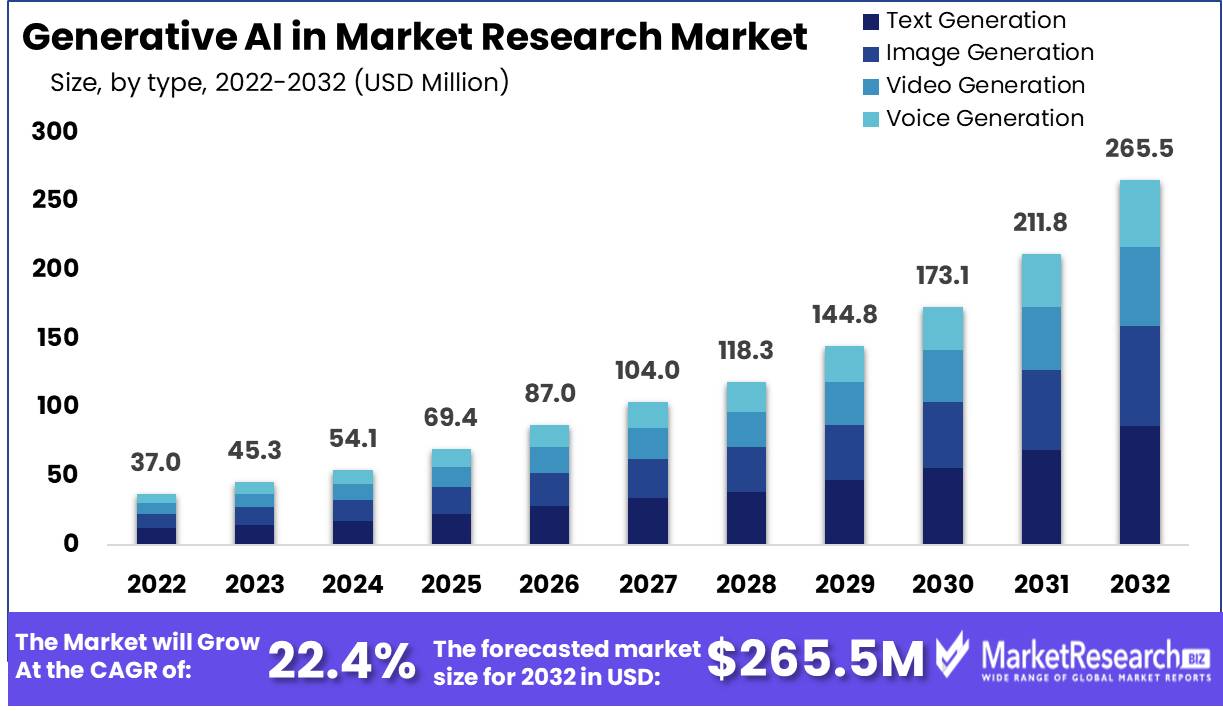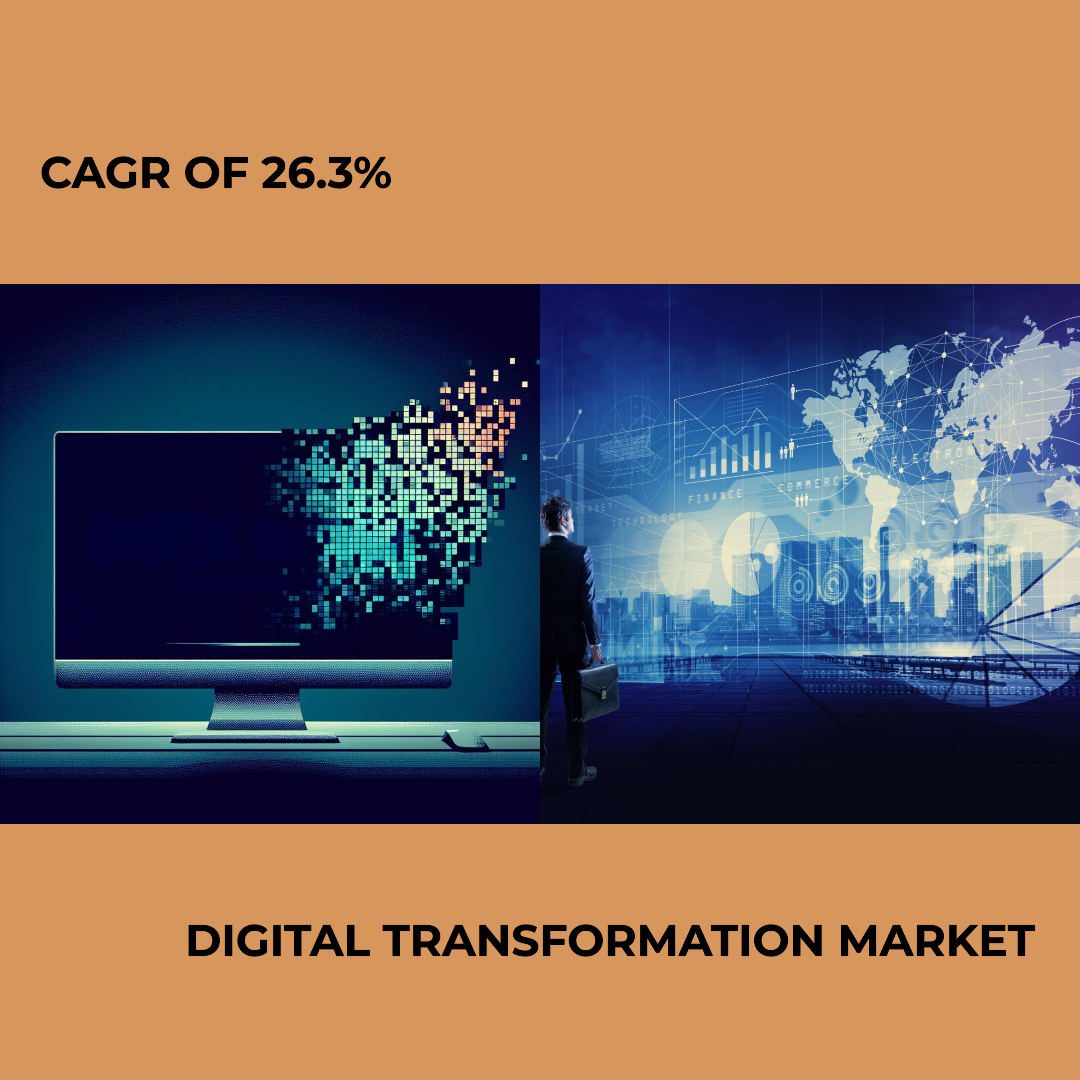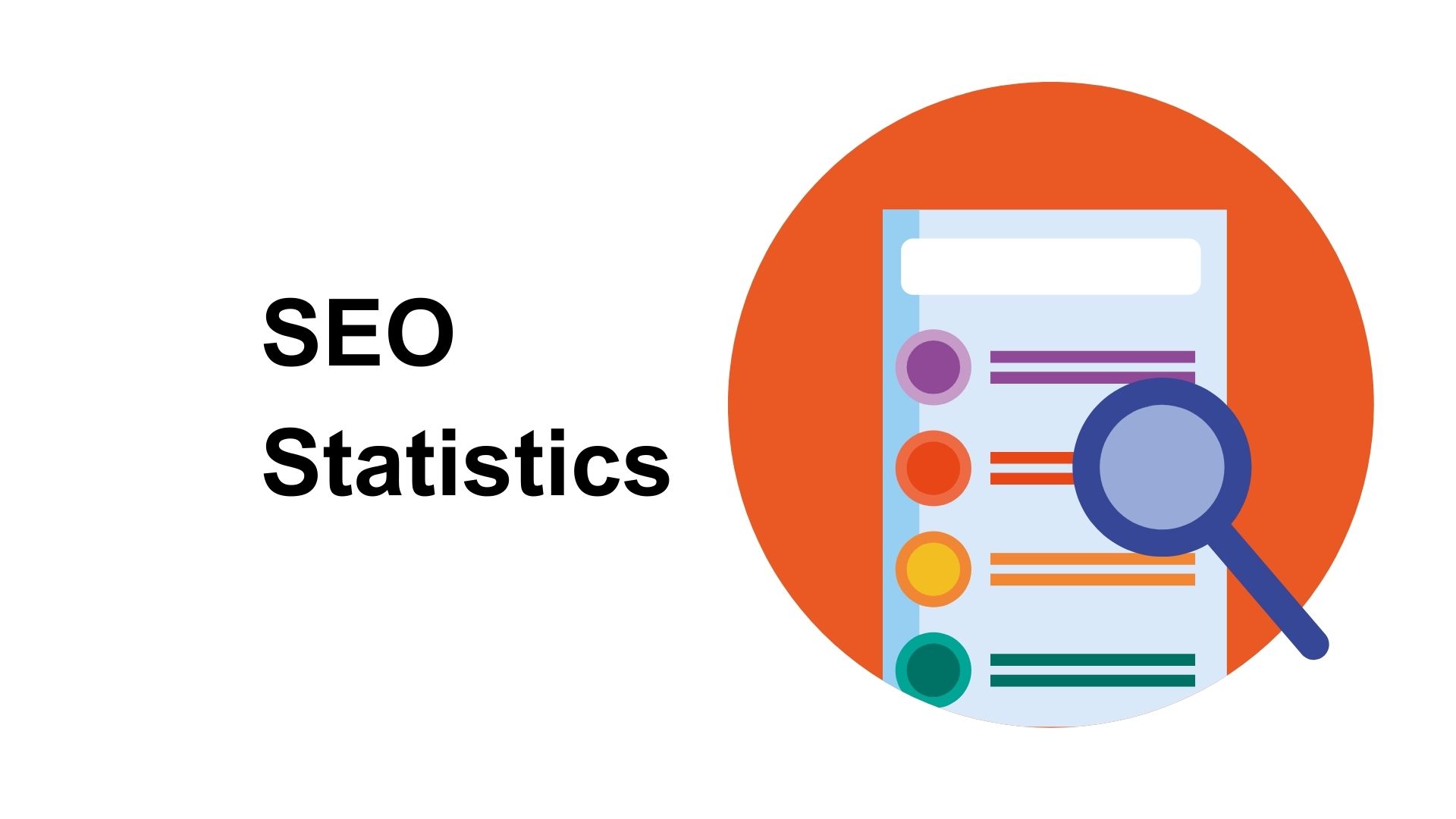Generative AI in Market Research Market to Hit USD 265.5 Mn by 2032

Page Contents
Market Overview
Published Via 11Press : Generative AI in Market Research Market size is expected to be worth around USD 265.5 Mn by 2032 from USD 37.0 Mn in 2022, growing at a CAGR of 22.4% during the forecast period from 2022 to 2032.
Generative AI has gained significant momentum and popularity within market research over recent years, revolutionizing how businesses gather and analyze market data while also offering valuable insights that support decision-making processes.
Generative AI refers to an artificial intelligence system's capability of producing new and original content based on patterns learned from existing data, such as images, texts, or even entire scenarios. Generative AI algorithms have proven particularly valuable when conducting market research by analyzing massive amounts of consumer data to generate meaningful outputs such as market trends, consumer preferences and product recommendations.
Generational AI offers market researchers numerous advantages when it comes to processing and analyzing large data sets quickly and efficiently. Traditional market research techniques often rely on manual data collection and analysis methods that take time and require human effort – which increases error risk significantly. Generative AI algorithms automate these processes significantly reducing time and effort spent extracting valuable insights from raw data sets.
Generative AI allows businesses to find patterns and trends not readily apparent through traditional analysis methods. By analyzing large volumes of data from sources like social media, online forums and customer reviews, generative AI algorithms can identify emerging market trends, consumer sentiment analysis and shifting preferences – helping businesses stay ahead of competition by tailoring strategies and offerings to suit shifting consumer preferences.
Generative AI also facilitates targeted marketing and product development. By analyzing individual consumer behaviors, preferences and purchase histories, businesses can create targeted campaigns and develop tailored products or services tailored specifically for certain customer segments – ultimately improving customer satisfaction while driving business growth.
Generative AI provides businesses with a powerful tool for market research: virtual simulations and predictive modeling. By creating virtual scenarios and simulating consumer reactions, businesses can test the potential impacts of new product launches, marketing strategies, or pricing changes without incurring significant costs or risks – thus making data-driven decisions and optimizing strategies to their fullest extent.
Request Sample Copy of Generative AI in Market Research Market Report at: https://marketresearch.biz/report/generative-ai-in-market-research-market/request-sample

Key Takeaways
- Generational AI provides market researchers with fast, efficient analysis of vast amounts of data, providing invaluable insights and allowing for faster decision-making processes.
- Generative AI provides accurate buyer personas that enable targeted marketing strategies.
- Market researchers can leverage generative AI for market research purposes to simulate and test various product designs, packaging options and marketing campaigns with reduced costs and risks associated with physical prototypes and trial-and-error approaches.
- Generative AI allows for predictive modeling that accurately forecasts future market trends, demand patterns and customer behavior–enabling businesses to stay one step ahead of their competition.
- Utilizing Generative AI, market researchers can unlock hidden patterns, correlations and emerging market segments – uncovering unrealized growth potential and innovation opportunities.
- Generative AI-powered sentiment analysis helps companies and organisations understand customer feedback and online reviews at scale, giving invaluable insights into brand perception and customer satisfaction levels.
- Market researchers can take advantage of generative AI to automate data collection, cleaning and analysis to free up time for more strategic considerations and higher-value tasks.
- Generative AI provides tailored marketing content and recommendations based on individual customer preferences, increasing engagement rates and driving conversion rates.
Regional Snapshot
- North American market research landscape is distinguished by a strong emphasis on data-driven decision making, with artificial intelligence (AI) playing an essential role in extracting actionable insights from massive data sets. Companies in this region use this AI technology to drive innovation and stay competitive across multiple industries such as technology, finance and healthcare.
- European businesses are taking note, using generative AI to revolutionize market research. By understanding consumer preferences and adapting to shifting market dynamics, generative AI enables businesses to better understand consumer needs while adapting pricing strategies accordingly and exploring new market opportunities across sectors like retail, automotive and tourism.
- Asia Pacific is experiencing rapid adoption of generative AI for market research purposes. Companies from China, India and Japan are using generative AI as a competitive advantage in the digital economy by processing and analyzing large volumes of data quickly – helping uncover consumer trends, optimize supply chains and enhance customer experiences.
- Generative AI is steadily making inroads into Latin American market research environments. Companies here are using it to gain deep insights into consumer behaviors, enhance product development processes and optimize marketing campaigns – with adoption expected to grow as organizations recognize its power to accelerate growth and innovation.
- The Middle East and Africa regions are witnessing an explosion of artificial intelligence as an influential technology for market research. Businesses from sectors like telecom, ecommerce, finance are using this revolutionary AI to analyze customer data, identify market trends and make data-driven decisions – this should play an increasingly pivotal role in driving economic growth and digital transformation across this region.
For any inquiries, Speak to our expert at: https://marketresearch.biz/report/generative-ai-in-market-research-market/#inquiry
Drivers
Increasing demand for data-driven insights
Modern business environments are increasingly driven by data, and organizations recognize its criticality to effective decision-making. Generative AI allows market researchers to quickly analyze large volumes of information quickly and extract insightful findings. Demand for such insight stems from organizations needing to make informed decisions, identify market trends, understand customer behavior, and gain a competitive edge.
Technological developments
generative AI continues to advance rapidly due to technological developments in natural language processing, computer vision and deep learning. These advancements augment the capabilities of generative AI models by helping them to analyze complex data sets more quickly, detect patterns within it more accurately and generate meaningful outputs – providing market researchers with greater insights into consumer behavior, sentiment analysis and market trends.
Cost and time efficiency
Generative AI provides significant cost and time efficiency in market research processes. Traditional market research methods often require significant manual effort and resources; Generative AI automates tasks such as data collection, cleaning and analysis reducing time and resources needed to derive insights enabling market researchers to analyze larger datasets faster while saving businesses both time and money in decision making processes and cost reduction efforts.
Data availability
The digital revolution has created an explosion of data from different sources like social media, e-commerce transactions, IoT devices and online platforms. Generative AI can process and analyze this immense volume of information for market researchers – giving them invaluable insights that were previously inaccessible. Market researchers can use AI for data-driven decisions and gain a competitive edge by making data-driven decisions using this technique.
Restraints
Privacy and Ethical Considerations of Data Analytics
Generative AI use in market research raises serious issues regarding data privacy and security as well as ethical implications of collecting consumer data. Market researchers must ensure their collection and usage comply with relevant privacy regulations and ethical guidelines, prioritizing privacy rights of individuals to maintain trust with customers.
Skill Gap and Expertise
Implementation of Generative AI Market Research requires specific skills and experience from market researchers. Market researchers need a solid grasp on both market research principles and generative AI techniques; however, due to a shortage of professionals possessing this knowledge and expertise in both domains organizations may face difficulty hiring skilled staff or upskilling their existing workforces.
Lack of interpretability
Generative AI models often operate like black boxes, making their reasoning behind their outputs hard to explain or interpret. This lack of explainability presents market researchers with a challenge when trying to present and interpret insights derived from generative AI to stakeholders or clients. Therefore, transparency must be ensured in order to establish trust in generative AI results and maintain confidence.
Integration with existing systems
Integrating generative AI solutions into existing market research systems and workflows can be complex. Market researchers must ensure compatibility, data integration and seamless collaboration between generative AI tools and existing infrastructure – but may face obstacles due to different data formats, system architecture or resistance from within their organizations – which requires careful planning and execution for successful integration.
Opportunities
Improved Customer Understanding
Generative AI offers businesses an opportunity to gain a deeper insight into customer preferences, behavior, and sentiment analysis. By analyzing vast amounts of data, generative AI models can identify patterns and trends while segmenting customers to generate insights which allow businesses to tailor products, services, marketing strategies to meet specific audience needs and desires resulting in improved customer satisfaction, increased sales.
Predictive Analytics and Forecasting Systems
Generative AI empowers market researchers to use predictive analytics to predict market trends, demand patterns, and customer behavior. Analyzing historical data with these models allows organizations to make accurate predictions and informed decisions that help optimize resource allocation decisions while simultaneously staying ahead of their competition.
Improved Product Development
Generative AI allows businesses to simulate and test various product designs, packaging options and marketing campaigns before actual implementation. This iterative testing process reduces costly failures while leading to more innovative product creation that prioritizes customer needs. Market researchers use generative AI as an invaluable resource when understanding consumer preferences in order to guide product development strategies, optimize features and anticipate market demand.
Personalized marketing and customer experience
Generative AI helps businesses provide tailored marketing content, recommendations and experiences based on individual customer preferences and behavior. By analyzing customer data, generative AI models can generate tailored messages, product suggestions and personalized offers which increase engagement levels, conversion rates and build long-term customer loyalty.
Take a look at the PDF sample of this report: https://marketresearch.biz/report/generative-ai-in-market-research-market/request-sample
Challenges
Quality and Reliability of Data
Accuracy and reliability of data used to train generative AI models is absolutely crucial to producing meaningful insights. Market researchers must ensure the integrity and representativeness of their data collection efforts; including addressing biases, incomplete or noisy data management issues and maintaining consistency between datasets. A rigorous data management process with quality checks should ensure reliable insights from generative AI.
Scalability and resource requirements
As data continues to expand exponentially, scaling generative AI models to accommodate large datasets can be challenging. Processing and analyzing big data require considerable computational power, storage space and infrastructure resources; market researchers must carefully consider scalability and resource requirements of their AI solutions in order to ensure efficient analysis while managing costs effectively.
Compliance
Adherence to regulations such as data protection laws, privacy regulations, and industry-specific guidelines is of utmost importance when using AI in market research. Market researchers must stay abreast of changing regulations by staying abreast of their latest status; understand their legal requirements regarding data collection, storage, processing and usage to ensure compliance. Navigating through regulatory complexity may prove challenging; for this reason organizations should implement strong data governance practices.
Ethical Considerations
Market researchers must carefully consider the ethical implications of using generative AI when conducting market research. Potential biases in algorithmic decision making, unintended results of targeted marketing, and privacy breaches all pose concerns when used inappropriately; market researchers must take care to consider these implications of using this technology responsibly, developing clear guidelines, frameworks, and standards regarding its usage to build trust between their customers and stakeholders.
Market Segmentation
Based on Type
- Text Generation
- Image Generation
- Video Generation
- Voice Generation
Based on Application
- Data Analysis and Visualization
- Survey Generation
- Sentiment Analysis
- Market Trend Forecasting
Based on Deployment
- Cloud-Based
- On-Premises
Key Players
- ai
- Microsoft Corporation
- Amazon Web Services, Inc.
- IBM Corporation
- Adobe
- Google LLC
- Genie AI Ltd.
- Other Key Players
Report Scope
| Report Attribute | Details |
| Market size value in 2022 | USD 37.0 Mn |
| Revenue Forecast by 2032 | USD 265.5 Mn |
| Growth Rate | CAGR Of 22.4% |
| Regions Covered | North America, Europe, Asia Pacific, Latin America, and Middle East & Africa, and Rest of the World |
| Historical Years | 2017-2022 |
| Base Year | 2022 |
| Estimated Year | 2023 |
| Short-Term Projection Year | 2028 |
| Long-Term Projected Year | 2032 |
Recent Developments
- In 2021, Google released LaMDA (Language Model for Dialogue Applications), an AI model dedicated to natural language understanding and dialogue. LaMDA seeks to enhance language processing while producing more accurate responses, which may prove valuable in market research applications involving consumer sentiment analysis or customer support interactions.
- In 2022, Nielsen launched their AI-powered analytics platform “Nielsen Connect”. Utilizing generative AI techniques to examine consumer behavior, market trends, and sales data; Nielsen Connect enables businesses to gain insights into consumer preferences while optimizing marketing strategies and making data-driven decisions.
- In 2022, Kantar Market Research Company, an industry leader, began exploring artificial intelligence applications in market research. Since investing in AI technologies to improve data collection and analysis capabilities, their goal has been to leverage generative AI for accurate yet actionable insights for their clients.
FAQ
1. What does “Generative AI” entail in market research?
A. Generative AI refers to the application of artificial intelligence techniques such as deep learning and neural networks to generate new data, insights or content. Generative AI can be utilized in market research for the analysis of large datasets, and simulation scenarios and deriving strategic insights for decision making purposes.
2. How does Artificial Intelligence benefit market research?
A. Generative AI offers several advantages for market researchers in market research. It speeds up data analysis, helps identify hidden patterns and trends, supports predictive modeling, enables personalized marketing and streamlines research processes. Generative AI empowers market researchers with valuable insights from complex datasets that drive data-driven decision-making while improving business outcomes.
3. What types of market research applications can use generative AI?
A. Generative AI can be applied to many market research applications, including consumer behavior analysis, sentiment analysis, demand forecasting, product development pricing optimization customer segmentation personalized marketing. Generative AI allows organizations to better understand their target audiences identify market opportunities enhance customer experiences.
4. How does Generative AI ensure data privacy and security in market research?
A. Generative AI practitioners must prioritize data privacy and security. By employing methods such as anonymization, encryption, and secure data handling protocols to safeguard sensitive information during data collection, storage, and analysis processes. Compliance with relevant data protection regulations is vital in maintaining the privacy and security of research data.
5. What are the challenges associated with using generative AI for market research?
A. Implementing AI into market research may present several obstacles, including data quality assurance, interpretability of AI-generated insights, integration with existing systems, regulatory compliance issues and finding skilled personnel with experience both in market research and AI. Overcoming these difficulties requires careful planning, ethical considerations, and ongoing evaluation of AI-driven research processes.
6. Can generative AI replace market researchers?
A. Generative AI is an indispensable asset that complements market researchers rather than replacing them. Although AI can automate data analysis and produce insights at scale, human researchers still provide important context, domain expertise, and interpretive abilities that AI cannot. Together they create more accurate and comprehensive market research results.
7. How can businesses begin using generative AI in their market research practices?
A. Businesses looking to utilize generative AI in market research should start by defining their specific research objectives and data needs, before exploring available generative AI tools or platforms, or teaming up with AI service providers or market research firms specializing in this technology. It is also crucial that businesses establish clear strategies, establish infrastructure needs and ensure adequate training of employees about AI concepts within their organizations.
Contact us
Contact Person: Mr. Lawrence John
Marketresearch.Biz
Tel: +1 (347) 796-4335
Send Email: [email protected]
Content has been published via 11press. for more details please contact at [email protected]
The team behind market.us, marketresearch.biz, market.biz and more. Our purpose is to keep our customers ahead of the game with regard to the markets. They may fluctuate up or down, but we will help you to stay ahead of the curve in these market fluctuations. Our consistent growth and ability to deliver in-depth analyses and market insight has engaged genuine market players. They have faith in us to offer the data and information they require to make balanced and decisive marketing decisions.



